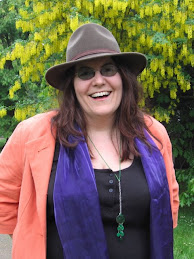Below is a short poem called 'Where Two Roads Meet'. It's about Rugby Market, and was specially commissioned by The Rugby Times newspaper, around the time I was appointed Warwick Poet Laureate.
Not being the sort of poet who writes much about urban life - though I often write about rural spaces, and either imaginary or past places - I found this commission quite a challenge at first. However, I live on the outskirts of Rugby, so I went into the town and wandered about for an hour or so, talking to people and looking for inspiration for this first poem.
Eventually I sat down with a coffee near the regular open-air market and realised that I had found my subject. With its colourful stalls and bustle of shoppers, a street market is a natural source of inspiration for any writer. And this particular market, so steeped in the history of the town - indeed the entire region - was clearly perfect as a vehicle for tracing local and historical development in Rugby.
After making copious notes on what I'd seen in the market, I headed off to Rugby Library and checked out some local history books. From my research, it was soon apparent that the market was the original heart of the town, the vital 'seed' from which the earliest settlements at Rugby grew.
Back in the Middle Ages, a lone trader must have stopped at this busy Midlands crossroads and set up his stall, thinking it a good spot to do business. Other traders stopped, and eventually stayed, and soon there would have been a thriving village based around the little market at the crossroads, which grew into a town, its importance as a trading place growing and changing with the centuries.
Later, a large cattle market was established further down the hill, a clock tower was built at the crossroads, stone-built shops sprang up around the stalls, the low-roofed 'Shambles' were built, and over time the market and its surrounding town grew into the modern Rugby we know today.
It was a fascinating background story, and one which I really wanted to address in my first ever 'official' poem about Rugby. But I also wanted to write about contemporary Rugby, the hustle and bustle of the market today.
I threw out some of my original notes as useless and went through several wildly differing drafts. I looked at old photographs for further inspiration, and played around with rhymes and my usual eccentric scansion. I knew the poem needed to be quite simple in form and content, for a general readership, but I also wanted it to reflect my interest in the origins of things, in local history and how it shapes our lives today.
This is how it turned out. I hope you enjoy it.
*
Where Two Roads Meet
(
for Rugby Market)
Where two roads meet, a man set up
his cart. Where the primrose
and the dog rose used to flower,
they built a market and a clock tower.
Soon, women in white petticoats sold
flowers and sweets, and men
in cloth caps drove carts and cattle
through the cobbled streets.
Today, two roads still meet
at the market awnings, striped
and neat, above the shouts
for bargain books and fresh-cut meat,
for shoes, potatoes and chrysanths,
for coconuts and underpants,
with stall-holders in caps and jeans,
and traffic choking up the streets
where Rugby past and present meet.
First published in The Rugby Times, September 2007











